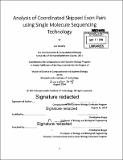Analysis of coordinated skipped exon pairs using single molecule sequencing technology
Author(s)
Adadey, Asa (Asa Owuraku)
DownloadFull printable version (6.382Mb)
Other Contributors
Massachusetts Institute of Technology. Computational and Systems Biology Program.
Advisor
Christopher Burge.
Terms of use
Metadata
Show full item recordAbstract
Alternative splicing of mRNA transcripts is a significant step in the production of functioning protein. This process is a major source of molecular diversity, as numerous mRNA and protein products can arise from a single gene locus, and incorrect regulation has been implicated in numerous diseases. While many robust methods exist to study genome-wide single exon splicing patterns, no methodology has been established to accurately examine multiple events over a single isoform. Read sequencing technology has been the limiting factor; however, the recent development of real time, single molecule read sequencing provides an opportunity to characterize alternative splicing on the whole transcript level. We propose a computational approach to detect the splicing patterns of pairs of alternative exons in the same gene. Using a sequenced full-length cDNA library of human MCF-7 transcripts, we are able to evaluate 761 genes and identify three with evidence of non-random splicing of distinct nonadjacent alternative exons, all of which are frame-preserving and biased toward mutual inclusion. Characterizing their protein products reveals that the domain, secondary, and tertiary structures of the isoforms are not significantly affected. Low read coverage proves to be the greatest hindrance to a larger result set, but overall we provide a computational proof of concept for studying coordinated alternative splicing events on a transcriptomic scale.
Description
Thesis: S.M., Massachusetts Institute of Technology, Computational and Systems Biology Program, 2014. Cataloged from PDF version of thesis. Includes bibliographical references (pages 31-35).
Date issued
2014Department
Massachusetts Institute of Technology. Computational and Systems Biology ProgramPublisher
Massachusetts Institute of Technology
Keywords
Computational and Systems Biology Program.